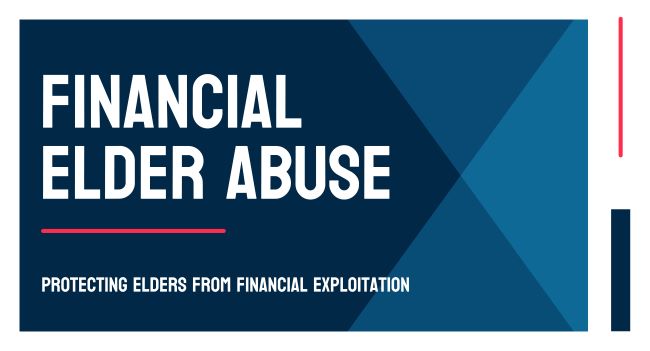Financial elder abuse is unfortunately common, meaning your loved ones may be at risk. Learn the warning signs and be proactive with your financial planning to protect your parents and other loved ones from these schemes.
What Is Financial Elder Abuse?
Investopedia says financial elder abuse involves taking advantage of older people and unfairly benefiting from their monetary resources. Financial elder abuse can stem from different individuals and organizations, including family members, business associates, caregivers, and even strangers.
Financial abuse comes in many forms, ranging from relatively small but still harmful incidents to major theft. The Consumer Financial Protection Bureau gives the example of a grandchild who offers to buy some shampoo for a grandparent. Once in possession of the grandparent’s debit card, the grandchild also makes some large purchases. As another example, an elderly person’s relative may receive power of attorney to oversee payment of nursing home bills. Instead of paying these bills, the relative may use the money for him or herself. The elderly person may then face eviction due to unpaid bills.
Oregon Financial Elder Abuse Laws
According to the U.S. Department of Justice, there are laws at the federal and state level to protect older adults from elder abuse and offer guidance to adult protective service agencies and law enforcement. However, these laws vary between states.
In Oregon, ORS 124.110 specifies the financial abuse that is subject to action. This includes when a person:
- Wrongfully takes or appropriates money or property of a vulnerable person.
- Continues to hold money or property belonging to a vulnerable person or fails to take reasonable steps to make the money or property available to the vulnerable person without good cause after the vulnerable person has requested a transfer and certain other criteria are met.
- Violates a restraining order regarding sweepstakes issued under ORS 124.020.
The Warning Signs
The Department of Justice says several warning signs may be indicators of financial elder abuse, including:
- Sudden changes in bank accounts or banking practices
- New names added to the person’s bank card
- Unauthorized withdrawals
- Abrupt changes to financial and estate planning documents
- Unexplained disappearance of funds or valuables
- Bills going unpaid despite adequate financial resources
- Forgery of person’s name on financial transactions and titles
- Previously uninvolved relatives suddenly claiming rights to assets
- Unexplained and sudden transfers of assets to someone else
- Services being rendered that the person does not need
How to Report Financial Elder Abuse
The Consumer Financial Protection Bureau says you should report suspected elder financial abuse to the Adult Protective Services in your state. If there is an urgent risk, you should call 9-1-1. Otherwise, you can call the local police. You can also report abuse to the local District Attorney’s office. When you report suspected abuse, you should provide as much information as possible, including the following:
- The time, date, and location of the incident
- The names of anyone who was involved and anyone who witnessed the incident
- A description of the suspected financial abuse and any other types of abuse or neglect that occurred
- Information about the victim’s disabilities or health conditions, including the victim’s decision-making abilities or memory loss
- Whether you believe there is an urgent risk of danger
In Oregon, you can report elder abuse by calling Oregon’s toll-free hotline: 1-855-503-SAFE (7233) or by using the Oregon Department of Human Services website. In the case of an emergency, dial 9-1-1.
How to Protect Your Loved Ones
One of the best ways to protect your elderly parents and other loved ones from financial abuse is to stay in touch and involved in their lives. This is especially important when loved ones are experiencing problems with memory loss or their cognitive ability that could make them vulnerable to abuse. Listen to their concerns, watch for signs that something is wrong, and stay alert for fraudulent sweepstakes and other scams that target the elderly.
Even if you are living in a different area, you can keep an eye on your loved ones. The Consumer Financial Protection Bureau recommends using technology to stay connected, such as text messages, social media, email, and video calls. You can also set up alerts to receive notifications about changes to your loved one’s bank account, such as if the account falls below a certain balance, and set up automatic bill pay, direct deposit for checks, and reminders about bills.
Proactive financial planning can help your loved ones avoid situations in which they are vulnerable. Without financial planning, unscrupulous individuals may try to take advantage of the situation to control the person’s finances. You should help your loved one take the following action BEFORE the person experiences significant cognitive decline:
- Select a trustworthy person to have power of attorney and assist with finances.
- Create a monthly budget to ensure your loved one is able to pay all bills.
- Determine how your loved one will pay bills – for example, using automated payments or having a trusted person make the payment each month.
- Organize and maintain records of all financial accounts and transactions.
It’s also important to be proactive about estate planning. Abusers may try to manipulate or coerce victims to name them as their heirs or they may try to add their names to property titles. Having an estate plan already in place can help protect elderly individuals from dishonest practices and financial elder abuse.
Do you need help setting up an estate plan? Contact Skinner Law.

